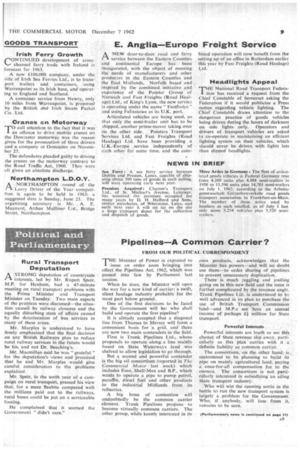Pipelines —A Common Carrier?
Page 11

If you've noticed an error in this article please click here to report it so we can fix it.
FROM OUR POLITICAL CORRESPONDENT THE Minister of Power is expected to issue an order soon bringing into effect the Pipelines Act, 1962, which was passed into law by Parliament last session.
When he does, the Minister will open the way for a new kind of carrier: a Swift, silent haulage industry probably for the most part below ground.
One of the first decisions to be faced by the Government will be: who shall build and operate the first pipeline?
It is already accepted that a diagonal line from Thames to Mersey will form a convenient basis for .a grid, and' there arc now two main contenders in the field.
First is Trunk Pipelines Ltd:, whose proposals to operate along. .a line mainly based on State Waterways land was shelved to allow legislation to go through.
But a second and powerful contender is the big oil consortium (reported in The Commercial Motor last week) which includes Esso, Shell-Mex and B.P., which wants to operate a pipe to _pump petrol, paraffin, diesel fuel and other products to the . industrial Midlands from its refineries.
A big bone of contention will undoubtedly he the common carrier element. Trunk Pipelines propose to become virtually common carriers. The other group, while keenly interested in its own products, acknowledges that the Minister has powers—and will no doubt use them—to order sharing of pipelines to prevent unnecessary duplication.
There is much juggling and jostling going on in this new field and the issue is further complicated by the revenue angle. Trunk Pipelines Ltd. is understood to be well advanced in its plan to purchase the use of British Transport Commission 'land—and M.P.s see 'here an annual income of perhaps a million for State transport.
Powerful Interests
Powerful interests are loath to see this chance of State revenue slip' away, particularly as this plan carries with it a definite liability as common carrier.
The consortium, on the other hand, is understood to be planning to build its pipe on mainly agricultural land, paying a once-for-all compensation fee to the owners. The consortium is not particularly interested in subsidizing an ailing State transport industry.
Who will win the opening sortie in the battle to run the new transport system is largely a problem for the Government. Who, if anybody, will lose from it, remains to be seen.




























































































































